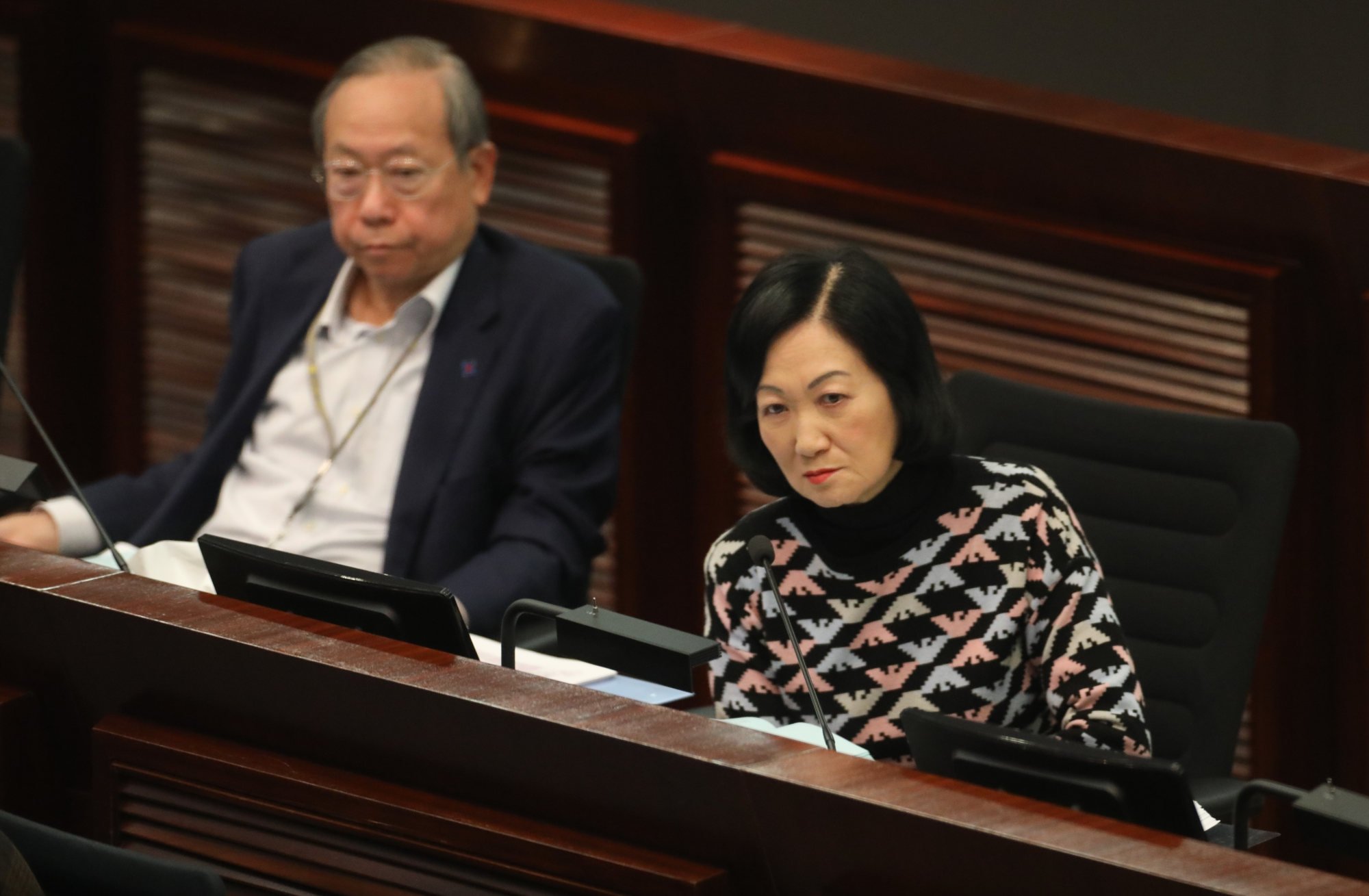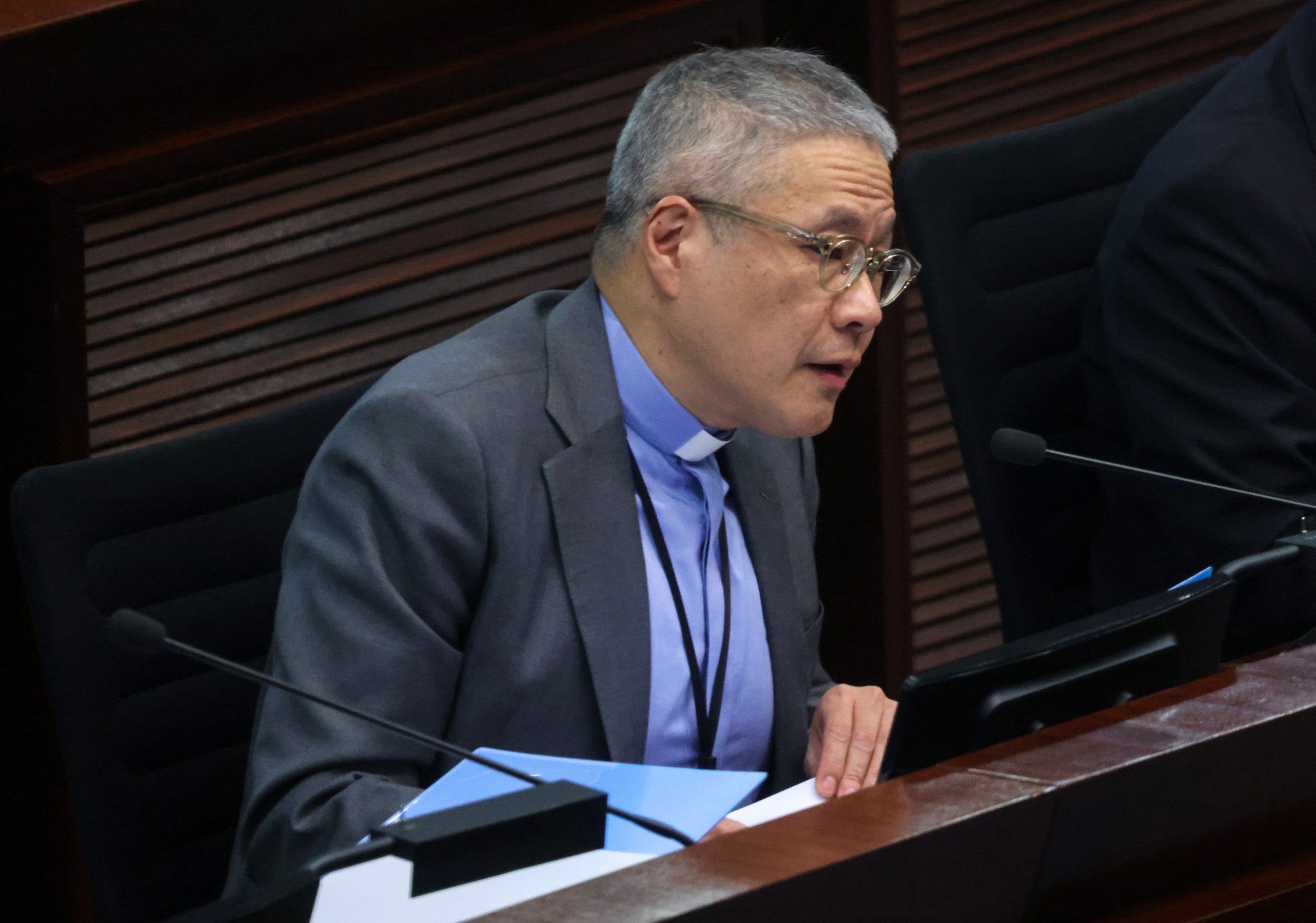
What are some of the key legal flashpoints under Hong Kong’s Article 23 law? The Post has answers
- Lawmakers have spent seven days in marathon proceedings scrutinising domestic national security bill, before quickly giving green light for proposed changes
- Back-to-back meetings have tackled questions on whether residents can keep copies of Apple Daily, offer support to absconding loved ones or swear at security officers
With lawmakers on Thursday unanimously approving the government’s changes to the bill and days away from writing it into the statute books, the Post takes a look at potential scenarios that have sparked public concern.
Can I keep old copies of Apple Daily?
Speaking on Saturday, lawmaker and Reverend Peter Koon Ho-ming asked ministers if holding on to old issues of the now-defunct tabloid could be considered possession of a seditious publication.
In Hong Kong, the possession of seditious publications is an offence under a law dating back to the colonial period. It will be incorporated into the coming Article 23 law, with the sentence to be raised from one year in jail to three years.
While officials speaking during the bill’s review process have avoided naming the tabloid amid Lai’s ongoing trial, they said copies of old publications could be considered seditious in the future regardless of when they were printed.
Secretary for Security Chris Tang Ping-keung earlier said anyone found in possession of such materials could reasonably argue they had no recollection of retaining copies and had not intended them for the purpose of incitement.
Can I ask public officers to quit the administration?
The bill also takes aim at anyone who “knowingly incites” a public officer to abandon upholding the city’s mini-constitution and forswear allegiance to the government, with the offence labelled as “inciting disaffection of public officers”.
Lawmaker Gary Chan Hak-kan, chairman of pro-Beijing political party the Democratic Alliance for the Betterment and Progress of Hong Kong (DAB), questioned on Saturday whether a public officer asking a colleague to retire and emigrate together counted as inciting disaffection.
Fellow lawmaker Regina Ip Lau Suk-yee also raised concerns over whether it would be a crime to call for a legislator to resign on personal grounds or ask a woman holding office to focus on giving birth and pocketing the government’s HK$20,000 cash handout.
Secretary for Justice Paul Lam Ting-kwok, however, said only behaviour such as “supporting Hong Kong independence, the secession of the city from the country and not supporting the city as a special administrative region of the country” would be considered abandoning the Basic Law and allegiance to the government.

What about disclosing treason?
Lawmaker Lo Wai-kwok raised concerns over how soon a person should report to police if they discover someone else “has committed, is committing or is about to commit” treason.
Under the proposed law, residents must report such instances to police “as soon as reasonably practicable” or face up to 14 years in prison.
Justice minister Lam stopped short of giving an exact time frame, but said the requirement simply meant to report any suspected crimes promptly under the circumstances.
“But some might wonder if not acting immediately would result in being caught by police the next second,” he said.
“But in the real world, it is not possible to notify the police in the blink of an eye. Therefore, it needs to be in line with common sense.”
Hong Kong minister slams newspaper’s ‘misleading’ take on Article 23 bill clause
A flashpoint between state secrets and fake news
Justice minister Lam warned earlier this month that public officers and government contractors who “give out false or fake information” with the intent to endanger national security could fall foul of proposed offences concerning state secrets.
Veteran lawmaker Ip raised a scenario where a public officer releasing “innocuous” fake news, such as a HK$30,000 (US$3,800) cash handout in the new budget, would be considered in breach of sharing state secrets.
Lam answered that even if the person in Ip’s scenario had not breached the domestic national security law, they could be held liable for misconduct in public office, warning officials “should not tell lies”.

Can a photograph land me in jail?
Lawmaker Kitson Yang Wing-kit touched on whether photographers selling pictures of prohibited areas while unaware their customer was a spy could fulfil the proposed law’s definition of espionage.
Security chief Tang stressed that passing by or taking pictures of prohibited areas with no intent to endanger national security did not fall under the offence, which is punishable by up to 20 years in jail.
Daphne Siu Man-suen, an acting law officer with the Department of Justice, warned that knowingly selling photos to organisations that pose a threat to national security could result in photographers facing legal consequences under the legislation.
Hong Kong’s Article 23 bill could be law just days after review of clauses ends
Is swearing at a national security officer considered harassment?
Amid discussions concerning unlawful harassment of persons handling cases or work concerning national security, lawmaker and Executive Council member Jeffrey Lam Kin-fung asked whether emotionally charged verbal abuse of an officer constituted harassment.
Under the bill, the offence carries up to 10 years in prison.
Acting Principal Government Counsel Ivan Leung said the circumstances behind a “momentary emotional outburst” should be taken into account when weighing whether it was harassment, stressing “intent” was a key factor in the decision.

Supporting absconded loved ones
On the fourth day of the marathon bill vetting, legislator Koon asked whether parents would be punished if they withdrew money in Hong Kong, travelled abroad or provided support for children who have absconded.
Acting principal counsel Leung said such conduct could fall under the scope of indirectly or directly funding an absconder and be considered a breach of the Article 23 law based on common law principles. In such cases, Hong Kong could exercise jurisdiction, he added.
The offence will be punishable by up to seven years in jail.
Clause-by-clause scrutiny of Hong Kong Article 23 security bill end on day 6
What counts as ‘causing hatred’?
Security chief Tang said that acts with seditious intent referred to those that could cause hatred and enmity.
“It is way more severe than just looking down upon someone,” he said.


